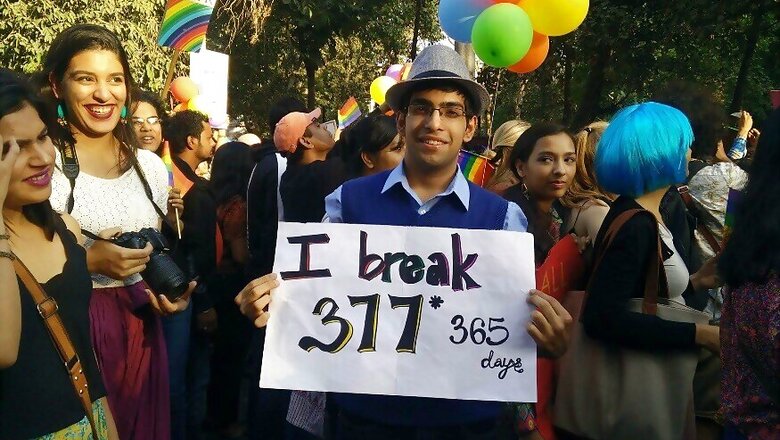
views
New Delhi: India sits on the precipice of history. After 160 years of subjugation and criminalisation, the over two million strong LGBTQ community of India today has a triumphant air of a hard struggle won.
The Supreme Court is poised to roll out its judgement on a clutch of petitions seeking the decriminalisation of Section 377 of the IPC, that makes ‘unnatural sex’ a punishable offence in India.
“It is going to be the end of an era of discrimination and humiliation of our people,” said Manavendra Singh Gohil, better known as Prince Manavedra, the world’s first openly gay member of royalty.
Follow live updates for Supreme Court's verdict on Decriminalising gay sex today.
Speaking to News18, the prince said that abolishing the law, often cited as ‘draconian’ and ‘imperial’, was long overdue. “Enough members of the LGBTQ community have suffered due to this criminalisation. Making someone’s sexual preference in bed a crime is not just unfair, it’s also unconstitutional according to the fundamental rights we are ensured as Indian citizens,” he said.
Being the first and only ‘gay royal’ in India made him the media’s darling. But the prince says that his privilege was also a curse. “My family disowned me after I came out to the world. It was not because I was homosexual, they knew about that for years. They only reacted when I told the world,” Manavendra told News18.
When Manavendra came out to the world in 2016, it created a media flurry and effigies of the him were burnt in Rajpipla, where according to his own admission, “people worshipped them” as role models. He was even heckled by villagers when he went to the small town.
According to the prince, who is the only son and probable heir to Raghubir Singhji Rajendrasinghji Sahib, Maharana of Rajpipla in Gujarat, it was the stigma attached to the idea of homosexuality that made them disown him and not his sexual preference. Laws like Section 377 help maintain the stigma by criminalising homosexuality.
In technicality, Section 377 does not criminalise homosexuality per se, but the act of ‘unnatural sex’ or non peno-vaginal coitus. But that, according to Manavendra , who runs a charity called Lakshya Trust to work with the LGBTQ community, it criminalised a core aspect of an individual’s being – the right to love.
But laws like Section 377 do not just hurt gay men.
According to hotelier and LGBTQ rights activist Keshav Suri, Section 377 is a problem for straight men as well. In an earlier interview with News18, the hotelier had said that 56 per cent of white-collar workers in India complain of homophobic discrimination. Insurance companies often do not want to ensure gay couples and job and pay gap is very prevalent.
Suri, who is among the current batch of petitioners, had added that decriminalising sexual acts between men would, in turn, help young men to come out more and demand acceptance in the workspace.
A resource guide titled ‘Creating Inclusive Workplaces for LGBT Employees in India’, created by Google, IBM, Goldman Sachs and Community Business last year, records that the LGBTQ community makes up about 5 to 10 percent of India Inc's workforce. Around 80 percent of them report discrimination in the form of homophobic comments, gestures, actions or even physical threats and violence.
Even in countries such as the US where homosexuality is legal and most states allow legal unions between the LGBTQ, a study by UCLA found that 21 percent of LGBTQ members who had participated in the study admitted to facing discrimination at work due to their sexual orientation.
Supreme Court advocate and co-founder of Lawyers Collective (LC) Anand Grover, who has for years been at the forefront of the LGBTQ legal movement in India, said that the decriminalisation would surely open up more space for the LGBTQ in the private sector.
Grover, who is the director of the HIV/AIDS unit of LC, clarified that decriminalising Section 377 does not necessarily mean acceptance of homosexuality. He does believe, however, that the verdict, which he is sure would be positive, would help the community to start a dialogue and usher in a new era where the community can demand further rights with respect to equality, discrimination and even marriage, though the last would still take a long time.
Interestingly, Grover said that decriminalising 377 would also lead to a discussion regarding the country’s rape laws, which are currently gender specific in terms of who the victim and perpetrator could be. So far, Section 377 was hitherto used to deal with sexual crimes against men (and also women). But it also made consensual non peno-vaginal sex illegal. Decriminalising Section 377 would finally bring to the light the prevalence of male rape and may help usher in laws that protect men, gay, straight or trans, from sexual assault.
The senior advocate also touched upon the importance of the decision on the transgender community, that continues to be persecuted under the law, despite the Supreme Court granting them legal status four years ago (Rights of Transgender Persons Bill 2014).
Speaking to News18, transgender activist Lakshmi Narayan Tripathi agreed. “It is cruel that so many people have been persecuted under the garb of ‘normal’. Our culture has always glorified love and sex. The ancients understood it, we even have gods for that. But then, modern politics criminalised sex.”
She added that it is just another way for the powerful to control and subdue the powerless and that abolishing laws such as Section 377 is essential for true inclusion and rights for the transgender. Failure to back Section 377 is also one of the holes in the modified Transgender Bill 2016 that was passed after two years in August by the Narendra Modi cabinet with 27 changes. A positive verdict would help strengthen the law and widen scope for the community to seek reservation in jobs and education.
“If the Supreme Court decides in our favour today, it will be a restoration of Indian culture that values acceptance and plurality. It will be the end of denying people their right based on their sexual identity and preference. It would be a golden moment, not just for the transgender community but for all of India,” Laxmi said.




















Comments
0 comment